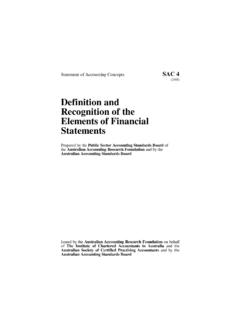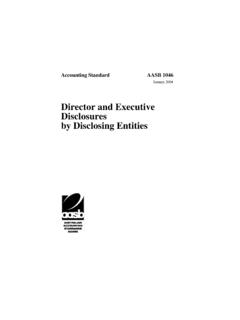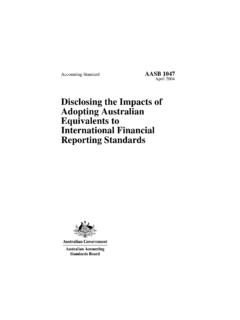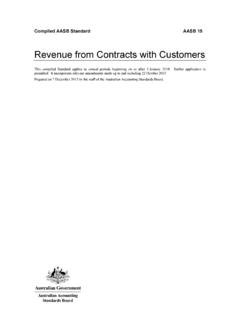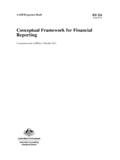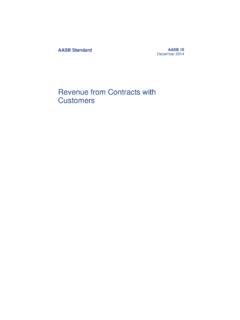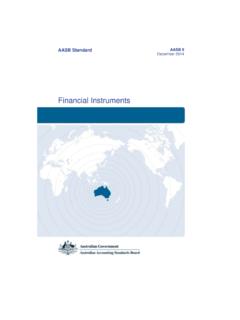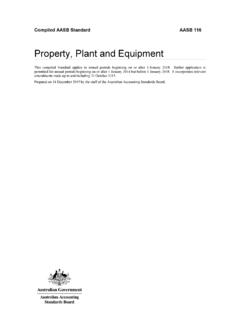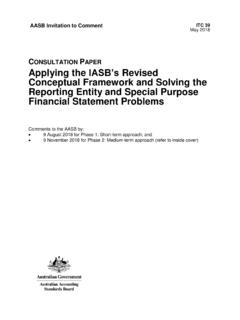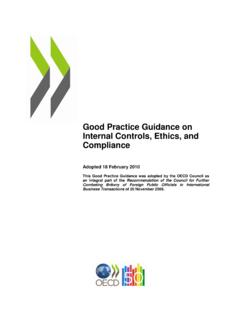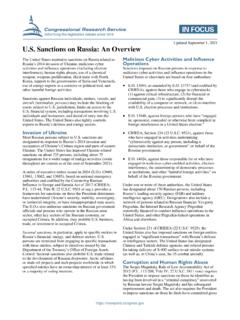Transcription of Definition of the Reporting Entity
1 Statement of Accounting ConceptsSAC 1(8/90) Definition of theReporting EntityPrepared by the public sector Accounting Standards Board ofthe Australian Accounting Research Foundation and by theAccounting Standards Review BoardIssued by the Australian Accounting Research Foundation onbehalf of Australian Society of Certified Practising Accountantsand The Institute of Chartered Accountants in Australia and by theAccounting Standards Review BoardThe Australian Accounting Research Foundation was established by theAustralian Society of Certified Practising Accountants and The Institute ofChartered Accountants in Australia and undertakes a range of technical
2 Andresearch activities on behalf of the accounting profession as a whole. Amajor responsibility of the Foundation is the development of Statements ofAccounting Concepts and Accounting Standards. The public SectorAccounting Standards Board is one of the boards of the Accounting Standards Review Board was established by MinisterialCouncil for Companies and Securities. It has responsibility for thedevelopment of Approved Accounting Standards for application bycompanies, and for the development of Statements of Accounting Conceptsand Australian Accounting of this Statement are available for purchase from the offices of theAustralian Accounting Research Foundation, 211 Hawthorn Road, Caulfield,Victoria 3162, The copying of this Statement is only permitted in certain should be directed to the offices of the Australian AccountingResearch 1035-3631- 3 -CONTENTSP aragraphsCitation.
3 1 Application and Operative Date ..2 INTRODUCTION ..3-5 DEFINITIONS ..6 DISCUSSIONG eneral Purpose Financial Reporting ..7-9 The Reporting Entity Concept ..10-18 Identification of Whether Dependent Users Exist ..19 Separation of management fromeconomic interest ..20 Economic or political importance/influence ..21 Financial characteristics ..22 Implications of Application of the ReportingEntity ConceptImplications of the criterion for identificationof a Reporting Entity ..23-28 Groups of entities as Reporting entities ..29-32 Implications of the Reporting Entity conceptfor current practice ..33 Implications of the Reporting Entity Conceptfor Differential Reporting .
4 34-37 ACCOUNTING CONCEPTSD iscussion and Definitions ..38-39 Concept of the Reporting Entity ..40 Preparation of general purpose financial reports 41- 4 -STATEMENT OF ACCOUNTING CONCEPTSSAC 1 " Definition OF THE Reporting Entity "Citation1 This Statement may be cited as Statement of Accounting ConceptsSAC 1 " Definition of the Reporting Entity ".Application and Operative Date2 This Statement applies to each Reporting Entity in relation to its firstreporting period that ends on or after 31 August 1990, and inrelation to subsequent Reporting purpose of this Statement is to define and explain the concept ofa Reporting Entity and to establish a benchmark for the minimumrequired quality of financial Reporting for such an ThisStatement outlines the circumstances in which an Entity or economicentity should be identified as a Reporting Entity .
5 It also outlines thecriterion for determining, for financial Reporting purposes, theboundaries of a Reporting relation to the benchmark for the minimum required quality offinancial Reporting , this Statement specifies that Reporting entitiesshall prepare general purpose financial reports and that these arereports which comply with Statements of Accounting Concepts andAccounting Statement does not consider techniques of accounting for andthe method of presentation of financial information about a reportingentity. Such considerations are included in Accounting the purposes of this Statement:"control" means the capacity of an Entity to dominate decision-making, directly or indirectly, in relation to the financial andoperating policies of another Entity so as to enable that other Entity 1In the Discussion section of this Statement, the term " Entity " should be read as referring alsoto an economic Entity , except where the narrower meaning of the term is 5 -to operate with it in achieving the objectives of the controllingentity.
6 "economic Entity " means a group of entities comprising acontrolling Entity and one or more controlled entities operatingtogether to achieve objectives consistent with those of thecontrolling Entity ;" Entity " means any legal, administrative, or fiduciary arrangement,organisational structure or other party (including a person) havingthe capacity to deploy scarce resources in order to achieveobjectives; and"general purpose financial report" means a financial reportintended to meet the information needs common to users who areunable to command the preparation of reports tailored so as tosatisfy, specifically, all of their information Purpose Financial Reporting7 Statement of Accounting Concepts SAC 2 "Objective of GeneralPurpose Financial Reporting " states that general purpose financialreports are prepared to provide users with information about thereporting Entity which is useful for making and evaluating decisionsabout the allocation of scarce resources (hereinafter "resources").
7 When general purpose financial reports meet this objective theywill also be a means by which managements and governing bodiesdischarge their accountability to those users. If Statements ofAccounting Concepts and Accounting Standards are to be effectivein ensuring adequate disclosure of information to users of generalpurpose financial reports, it is necessary that all those entities whichshould report, do report. In addition, if the regulation of generalpurpose financial Reporting is to be developed on a rational andefficient basis, it is equally important that those entities for whichthere is no justification to report are not required to reports which meet the objective of general purposefinancial Reporting are general purpose financial reports.
8 Generalpurpose financial reports should be prepared when there exists, inrelation to an Entity , users whose information needs have commonelements, and those users cannot command the preparation ofinformation to satisfy their individual information needs. Suchreports will provide users with appropriate information for makingdecisions relating to the efficient allocation of 6 -9 Efficient allocation of resources is facilitated by ensuring thatgeneral purpose financial reports contain information of at least theminimum required quality. Accordingly, general purpose financialreports should be prepared in accordance with Statements ofAccounting Concepts and Accounting Reporting Entity Concept10A number of alternative concepts of the Reporting Entity are implicitin existing legislation and regulations which specify the entitieswhich should prepare general purpose financial reports.
9 Theseconcepts include the legal Entity concept, which has been employedin legislation in the private sector , and a broad concept based onaccountability of elected representatives and appointed officials,which has been employed in the public sector . In the private sectorit has been common for entities to be required to report wheneverthey have had legal status (for example, companies have been soobliged). In the public sector the accent on accountability has seenwidespread application of the fund concept of Reporting , whichimplies a concern with Reporting the results of individual funds. Inother cases, the concept based on accountability of electedrepresentatives and appointed officials has led to entities which havesuch representatives and/or officials preparing general purposefinancial concepts referred to in paragraph 10 do not give adequateconsideration to user needs in identifying the Reporting Entity .
10 In theprivate sector it is possible that users exist in respect of reportingentities which are not legal entities and for which legislationrequiring the preparation of general purpose financial reports doesnot exist, for example, partnerships, most trusts, and , in the public sector it is possible that users exist in respectof entities other than the fund or the electoral Entity , for example, inrespect of individual statutory authorities, departments andgovernments. If accounting concepts, developed within aframework which identifies users' information needs as primary, areto satisfy the objective of general purpose financial Reporting , thoseconcepts must be related to users' information Statement adopts a concept of the Reporting Entity which is tiedto the information needs of users and the nature of general purposefinancial reports.
